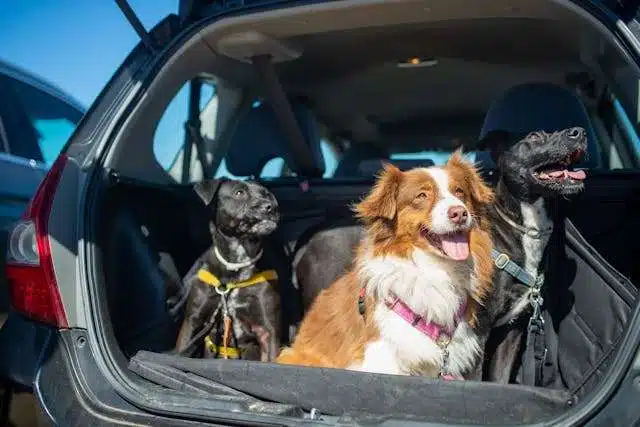Diarrhea… Even our dogs have experienced it, even if it’s not pleasant to talk about. However, when this happens to your pet, they look to you for help. Throughout this article, we will explore the causes, symptoms, and treatment of diarrhea in dogs. First, let’s explore why it happens.
Table of Contents
ToggleCauses of Dog Diarrhea
There’s always something to blame for your dog’s loose bowel movements, even if it’s as simple as an upset stomach. Some of the most common reasons why your dog has loose stools include:
1. Dietary indiscretion: The majority of dogs love to eat just about anything. Dirt, plastic, garbage, and even some human foods can upset your dog’s stomach.
2. Food allergies: You may find that your dog is allergic to or intolerant to certain ingredients in their food. There are many proteins in kibble, such as beef and chicken, as well as extras like soy, dairy, and wheat, which could contribute to this problem. While it may be difficult to pinpoint the problem on your own, your veterinarian can help you uncover the culprit.
3. Viral or bacterial infections: Diarrhea is often the main symptom of viruses like parvovirus and bacterial infections like salmonella.
4. Intestinal parasites: Whipworms, roundworms, hookworms, and microorganisms like Giardia and coccidia can cause diarrhea.
5. Toxins: If your dog consumes toxic substances like poisonous food, painkillers, or antifreeze, their bodies will try to filter them out. Diarrhea is one way this may happen.
6. Illness: There are many illnesses that include diarrhea as a symptom. Diarrhea is a common symptom of a wide number of dangerous illnesses, from IBD to colitis to liver disease and even cancer.
Decoding Your Dog’s Diarrhea: The First Step of How to Stop Dog Diarrhea
As you’re now familiar with typical causes, let’s take a closer look at their stools. Whenever your dog experiences diarrhea, ask yourself these questions to determine what’s going on:
What color is it? There may be internal bleeding if your stools are black, tarry, and your diarrhea has visible red blood. Immediately contact your veterinarian if your dog’s diarrhea is black, or dark brown, or if red blood is visible. You should not be concerned if your pup has yellow diarrhea after eating a bland diet to soothe loose stools. Otherwise, let your vet know.
How often does it happen? There are two types of dog diarrhea: acute and chronic. There are usually only one or two episodes of acute diarrhea, which can usually be treated at home with home remedies. Chronic diarrhea keeps happening over two days or more. It also persists despite treatment. In most cases, more worrying causes are associated with IBD, parasites in the intestines, and illnesses or infections. So if your dog is suffering from chronic diarrhea, contact your veterinarian right away.
Is there something in it? Is there grass in your dog’s stool? How about small, white specs? Your dog’s poop probably contains bits of worms. You might even see foreign objects like socks or rocks in your dog’s fecal matter. As icky as it can be, spotting what’s in your dog’s poop could indicate what the cause is.
How To Treat Diarrhea In Dogs Naturally: 4 Home Remedies To Treat Dog Diarrhea
If your dog has diarrhea but doesn’t show any additional symptoms like vomiting or loss of appetite, consult your veterinarian, You can help your dog feel better at home by relieving his discomfort. Here are four simple and effective home remedies:
1. Serve your dog a bland diet: When your dog has upset bowels, a bland diet of boiled white meat chicken and white rice is a classic treatment. Besides being easy to digest, rice starch can help your dog’s poop solidify. You can ask your vet for a bland recipe and feed it very little at a time.
2. Feed them a scoop of Pumpkin Powder or canned pumpkin: For diarrhea and constipation, pumpkin is often recommended as it helps regulate stool consistency. When it comes to pumpkin, you’ve got two options. If you want to give your dog Pumpkin Powder, you can scoop some into their bowl. There’s no waste with this dish since it’s easy to prepare and a great alternative to canned pumpkin. Or you can offer canned pumpkin. Make sure you use plain canned pumpkin without any added ingredients. You don’t want to accidentally feed your dog canned pumpkin pie because it contains harmful ingredients to dogs.
3. Keep your pup hydrated: When your dog experiences diarrhea, they can lose a lot of moisture. You can give your dog fresh water or a Bone Broth topper, which hydrates them while replenishing lost electrolytes.
4. Give your dog a daily scoop of Probiotics: A probiotic is a type of bacteria that is naturally found in your dog’s digestive system. As well as improving digestion, they strengthen the poop of dogs, preventing diarrhea from occurring, and resolving cases.
Chronic or severe diarrhea? Call your vet. It is your responsibility as a pet parent to give your pup the best care possible. You should visit the veterinarian if home remedies do not work or you feel something is wrong.
Don’t worry – most of the time everything will be fine. When your dog has loose stools, you have probably given them too many table scraps or they ate something they shouldn’t have. Use the home remedies we explore to soothe their furry little belly when they’re experiencing acute diarrhea.



